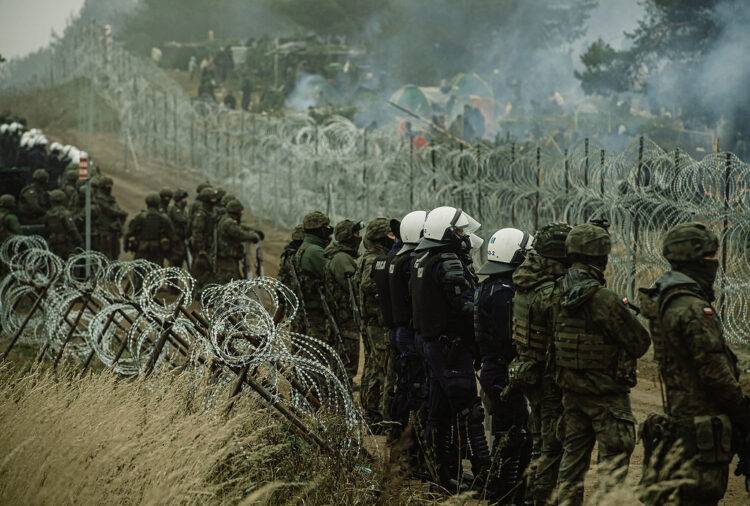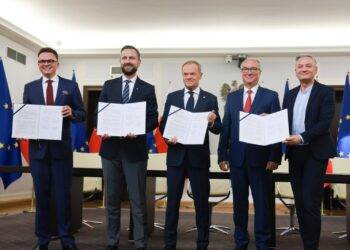Poland’s Ministry of Foreign Affairs has summoned Aleksei Ponkratenko, the temporary chargé d’affaires of Belarus, following the tragic death of a Polish soldier on the border shared by the two nations. This move underscores the rising tensions and ongoing security concerns between Poland and Belarus.
The Polish foreign ministry, in a strongly worded note, demanded an end to what it described as provocations at the border. These provocations include organized migration movements, which Poland sees as part of a broader, hybrid attack aimed at destabilizing the country. The ministry’s statement painted a grim picture of Poland’s current security landscape, mentioning death squads, murders, arson, trolling, and cyberattacks targeting critical infrastructure. “This is a harsh attack on Europe,” the ministry declared, emphasizing the severe nature of the threats.
Foreign Minister Radoslaw Sikorski further elaborated on the incident, blaming the Belarusian authorities for the orchestrated nature of the attack. He stated, “This is not an individual decision of bandits who attacked our soldier, but the result of preparation by the Belarusian side. And I promise that the Belarusian authorities will face consequences.” The ministry’s note explicitly demands the identification and extradition of the suspect involved in the killing of the Polish soldier.
Incident on the Polish-Belarusian Border
The backdrop to this incident is a fraught and increasingly hostile border situation. Over the past two years, illegal migrants have frequently attempted to breach the borders between Poland and Belarus. Intelligence reports suggest that the regimes of Russian President Vladimir Putin and Belarusian President Alexander Lukashenko are deliberately transporting migrants to these border areas. These actions are viewed as deliberate provocations designed to destabilize the region.
On May 28, a particularly violent confrontation occurred when an illegal migrant attacked a Polish soldier with a knife. Despite receiving medical treatment, the soldier succumbed to his injuries and died in the hospital on June 6. This incident has escalated already high tensions and has prompted Poland to take a firmer stance on border security.
In response to the growing crisis, Poland’s Ministry of Internal Affairs has proposed measures to tighten control along the border. One such proposal includes temporarily closing access to certain areas near the border to prevent further incidents and enhance security.
A Broader Pattern of Provocations
The death of the Polish soldier is part of a broader pattern of aggressive actions attributed to the Belarusian government. The use of migrants as tools for political leverage has been a notable tactic in this hybrid warfare. These actions are seen as attempts by Belarus, supported by Russia, to destabilize Poland and, by extension, the European Union.
The ongoing crisis at the border has drawn international attention and condemnation. Poland has called on its European and NATO allies for support in addressing these security challenges. The situation highlights the broader geopolitical struggles playing out in Eastern Europe, where border security, migration, and regional stability are deeply intertwined.
Historical Context and Current Implications
The current tensions between Poland and Belarus cannot be fully understood without considering the historical context. The relationship between the two countries has been strained for years, marked by political disagreements and divergent paths since the end of the Cold War. Poland, a member of both the European Union and NATO, has often found itself at odds with Belarus, which remains closely allied with Russia.
The use of migrants in hybrid warfare represents a modern twist on old geopolitical tactics, blending traditional military strategies with new forms of psychological and economic pressure. This approach aims to exploit the vulnerabilities of target nations, creating chaos and undermining public confidence in government institutions.
The international community’s response to these events will be crucial in determining the future stability of the region. Poland’s firm stance and call for consequences against Belarus signal a potential shift towards more aggressive policies to counter these hybrid threats. How NATO and the European Union choose to support Poland could set important precedents for dealing with similar crises in the future.


















